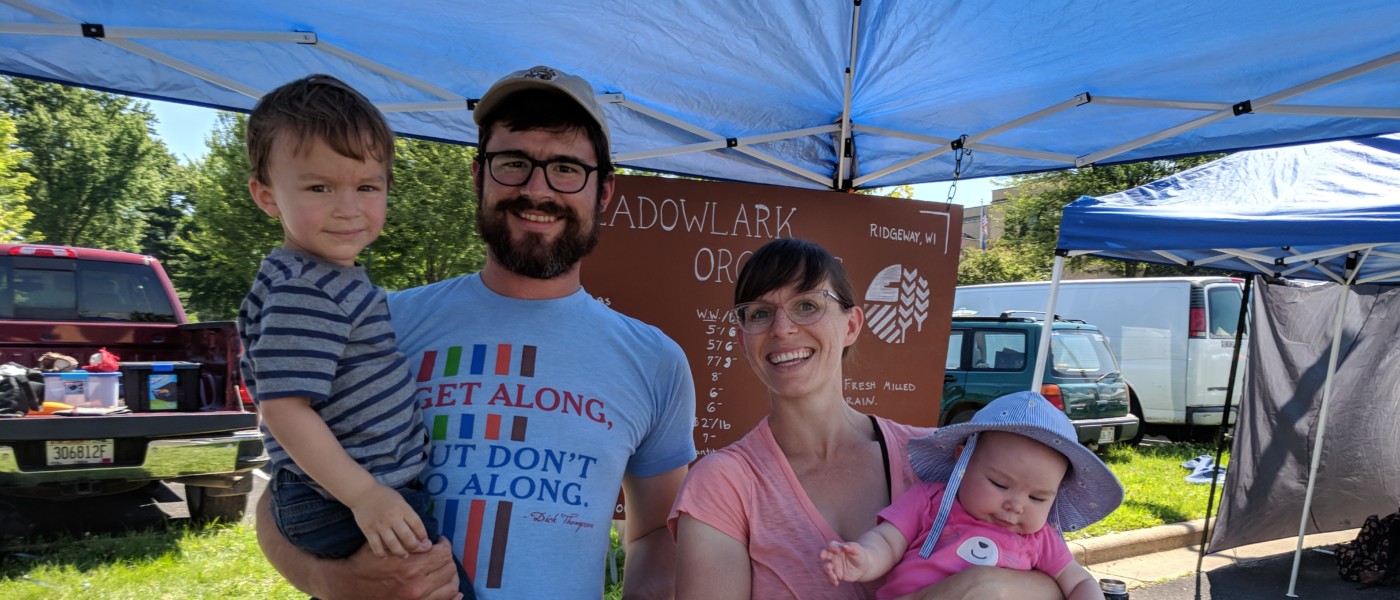This story is about young beginning farmers. But this is a different story than most. Vegetable production and struggles finding affordable land dominate most beginning farmer experiences, but not at Meadowlark Organics in Ridgeway, Wisconsin. There, the narrative is about grain farming and the transfer of established land from a veteran farmer – Paul Bickford – to the next generation – Halee and John Wepking.
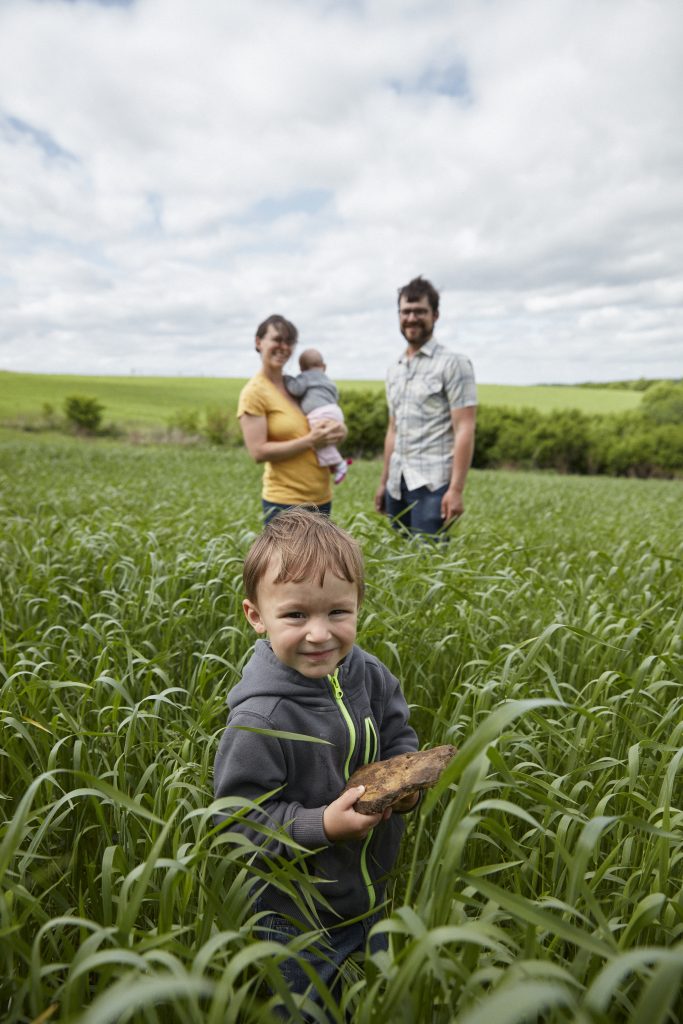
Photo: John Lee
John, who feels passionate about setting up other young farmers for success, explains how at farm conferences they often “run into people who say, ‘step one is to rent or buy a farm.’ And we’re like: ‘No! Step one is get a job and learn what you want your farm business to be while farming.’” That was the Wepking’s plan to get started. And, as luck would have it, Paul was looking for young farmers just like them in a very unlikely spot: Craigslist.
Halee was the one who initially responded to Paul’s ad. Paul has a 700-acre, organic farm in the Driftless region of Wisconsin, which he has been farming since the early 1980s. When retirement started lurking on the horizon, he decided to try to find like-minded farmers to help him farm the land. Luckily, Halee and John were the right fit.
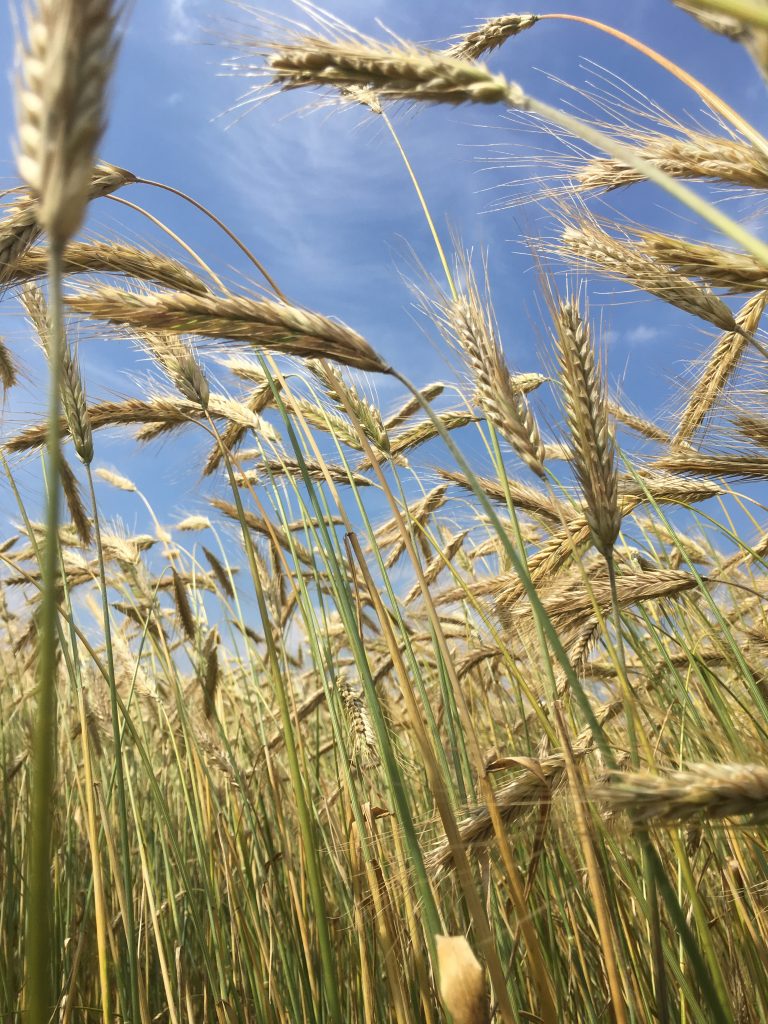
Photo: John Wepking
At the time, the couple, who worked and met in NYC restaurant kitchens, were running a restaurant in Lancaster, WI, and Halee was seven and a half months pregnant. But after meeting Paul, they immediately closed up the restaurant and became farmers.
They were taken by Paul’s story—one of commitment to the land, and creativity in finding ways to transform his business. He started his operation as a confinement dairy. When that model stopped working for him in the early 1990s, he transitioned to grass-based dairy, which was pretty radical at the time: “Everyone at the university was like, ‘you’re crazy.’ But he did it anyway. In part because he basically felt like he didn’t have a choice, because what he was doing wasn’t working,” says Halee.
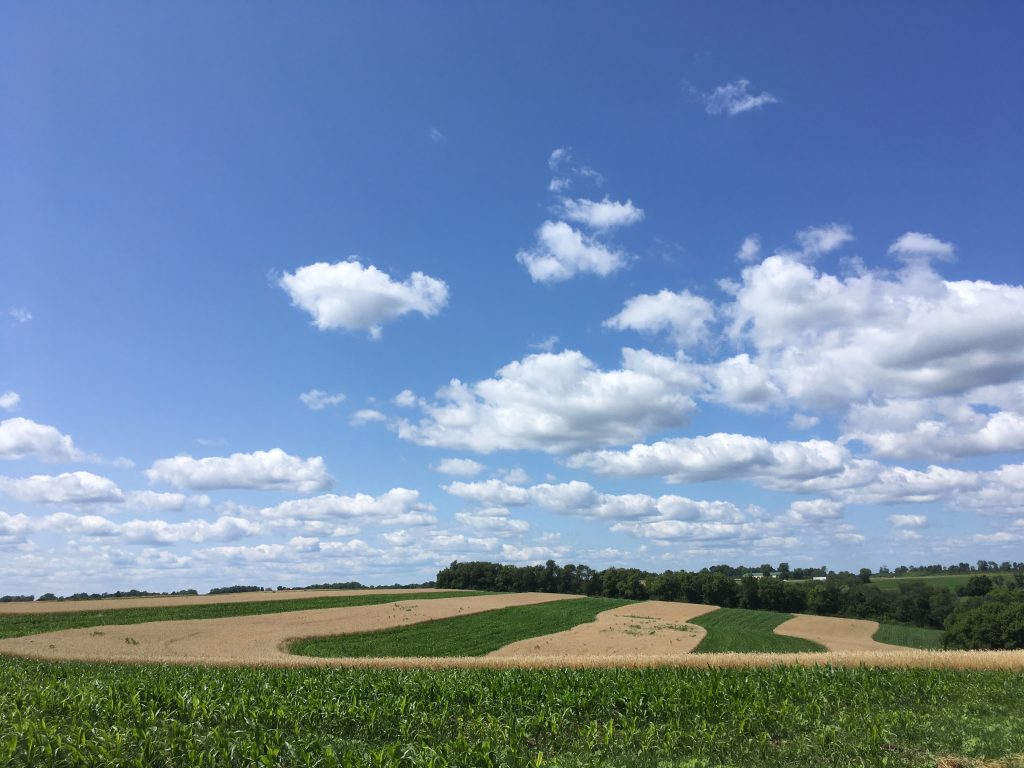
Photo: John Wepking
This new grass-based model worked for a while. At the farm’s peak, there were 700 cows on its grass. But then, for a complicated set of reasons, he quit milking cows and sold the herd. What could’ve been the death of the farm all together was actually a rebirth.
Since Paul hadn’t been spraying his pastures, he was able to easily transition into organic grain production, focusing mostly on organic hay and oats for the feed market. That was in 2011. By 2015, he put out his Craigslist ad. John explains that Paul let them switch up the operation a bit in the hopes that maybe one day they’d take over the farm: “That’s what we’re working towards now! He let us run with our ideas of doing a lot more food-grade and small grains,” exclaims John.
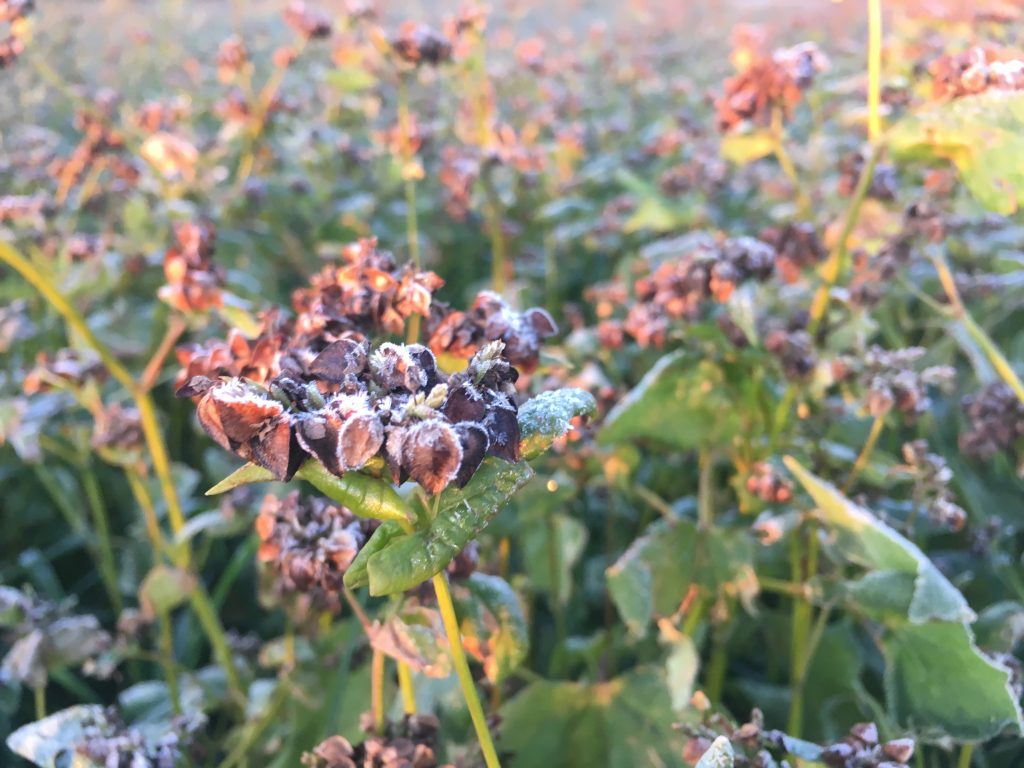
Photo: John Wepking
Responsible farm succession brings positives for all parties. John notes, “There’s a lot of people like Paul, who don’t have children and they’re interested in keeping the farm going. But, often when farms transfer to nonfarming children, it’s very difficult for it to get back to a family farm because it just becomes real estate.” Also, having deep enough coffers to buy land plus big-ticket equipment like combines is a burden for many farmers just starting off. So succession ends up being mutually beneficial. For grains in particular, Halee and John knew they needed enough land to farm at a scale that made sense. And, Paul brought a third component: knowledge, something Halee and John stress can’t be learned just by reading.
They had the land, the equipment and the mentor, but the Driftless region of Wisconsin brought them another critical piece of the puzzle: a local mill to turn their grain into flour. “That kind of infrastructure is critical for a regional grain economy. It was the perfect storm; we had the exposure and the inspiration from what was happening in New York City with local grains at farmers markets, and then we had the access to the land, equipment and finally, infrastructure,” says Halee.
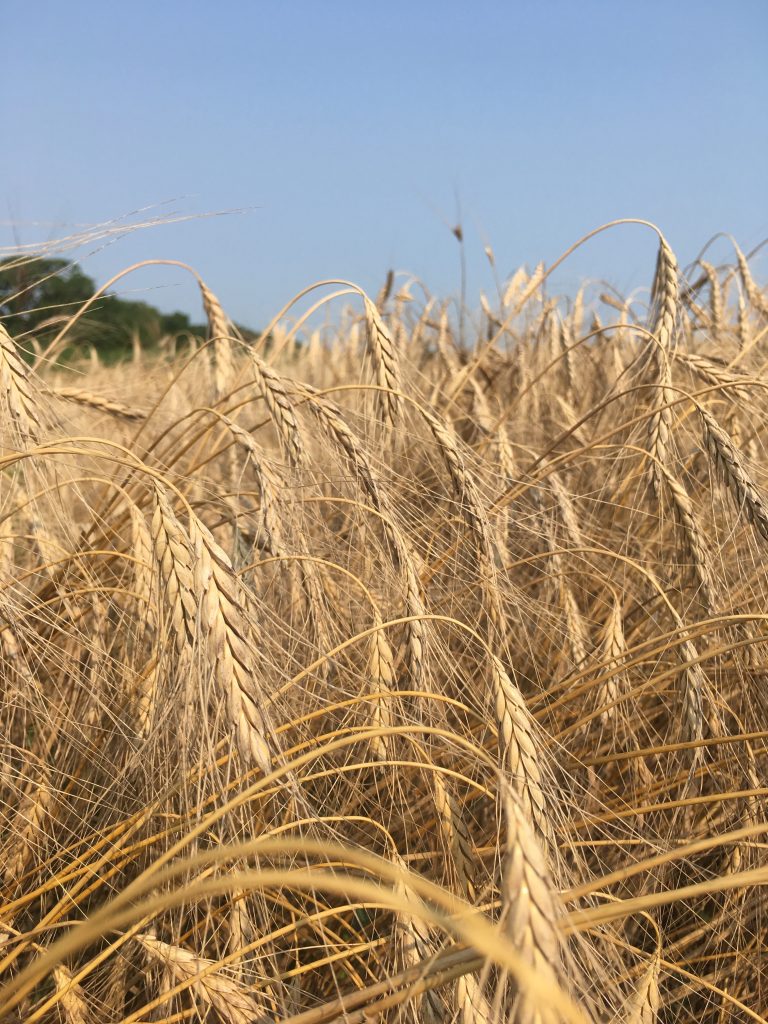
Photo: John Wepking
Even with all of this background in place, the weather keeps them guessing. John says 2018 brought incredible heat in May that killed their grain yields. And conversely, this year’s story is rain! “It’s been wet, wet, wet. You know the wettest 12 months in Wisconsin history, I think,” he explains.
To cope, they have a six to eight-year rotation for most of their crops; and they raise six to seven different crops, “So if we have a 700-acre farm, and 100 acres of about seven different crops, that helps a great deal to mitigate some of that weather variability, because invariably if one crop gets washed out by rain, there’s another crop that’s relishing in it,” says John. “It’s kind of a hedge. Because it diversifies your income, but it’s also an incredible number of things to manage.”
For grains in particular, Halee and John knew they needed enough land to farm at a scale that made sense. And, Paul brought a third component: knowledge, something Halee and John stress can’t be learned just by reading.
In the past few years on the farm they’ve learned all of these techniques. And they’re not taking this knowledge base for granted—they’re using it to inspire more farmers to start planting small grains (which isn’t as easy or as popular as starting in vegetables because of the land and mechanization needs). Halee explains, “It’s a lot of work, but it’s also really critical. Small grains are important from a soil health perspective, and also from an economic development perspective.”
She explains how regional grain economies that are popping up around the country, “I think about all of the jobs that are created in that situation, whether it’s a cleaning and storage facility that’s run cooperatively by farmers or a mill that employees several people. These are real opportunities to revitalize these rural communities.”
Paul, Halee and John’s agreement ensures a stable farm business without overburdening the Wepkings in debt, while giving Paul a pension. “We have a pretty rock-solid foundation and set of shared goals that’s really allowed us to move forward,” says John. And Halee chimes in: “There’s a lot of incentive to make it work for all parties involved.” And, with that, the two go back to managing their land, their family, and growing their community in rural Wisconsin.

Photo: John Lee
